Book contents
- Frontmatter
- Contents
- Figures
- Tables
- Acknowledgments
- 1 Money and Politics on the International Stage
- 2 A Theory of Trading Security Council Votes for Aid
- 3 Examples of Punishments, Threats, and Rewards
- 4 Who Wins Election to Represent the World?
- 5 Statistical Evidence of Trading Finance for Favors
- 6 Consequences of Politically Motivated Aid
- 7 Reforming the UNSC
- References
- Author Index
- Subject Index
2 - A Theory of Trading Security Council Votes for Aid
Published online by Cambridge University Press: 05 June 2014
- Frontmatter
- Contents
- Figures
- Tables
- Acknowledgments
- 1 Money and Politics on the International Stage
- 2 A Theory of Trading Security Council Votes for Aid
- 3 Examples of Punishments, Threats, and Rewards
- 4 Who Wins Election to Represent the World?
- 5 Statistical Evidence of Trading Finance for Favors
- 6 Consequences of Politically Motivated Aid
- 7 Reforming the UNSC
- References
- Author Index
- Subject Index
Summary
Introducing a Logic of Trading Favors on the International Stage
What is the logic of trading money for political influence on the UN Security Council? This seemingly innocuous question contains a number of analytical puzzles addressed in this chapter. Note that numerous studies have established that governments use foreign aid for certain political purposes. It is not obvious, however, that targeting members of the UNSC represents a good choice. Some governments have strong views on foreign policy and adamantly oppose the United States and its allies. These governments – Cuba under Fidel Castro comes to mind – may prove unwilling to sell their votes. Other governments tend to agree with Western powers and may freely offer their political support with no strings attached. Under what conditions, then, are UNSC votes for sale, and when are they worth buying?
Swing voters may constitute a likely target. Note that when we say “swing,” we mean voters who may be willing to change their vote under certain circumstances. Imagine, for example, a country with a weak preference – in the absence of any enticements – of voting against a resolution supported by the United States. If the United States has previously established a strong working relationship with such a country – delivering foreign aid packages, advocating on its behalf at the IMF and the World Bank, and generally supporting that country in subtle ways – the track record of goodwill might influence the country's voting behavior on the Security Council.
- Type
- Chapter
- Information
- The Political Economy of the United Nations Security CouncilMoney and Influence, pp. 35 - 61Publisher: Cambridge University PressPrint publication year: 2014
- 1
- Cited by



